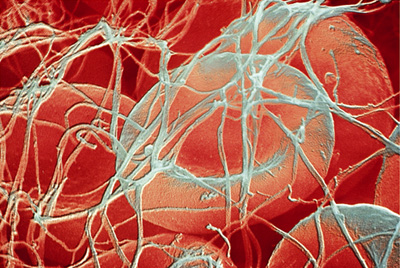|


The basic scopes of coagulation are the blockage of bleeding, caused by ruptured vessels
and the maintenance of normal blood circulation. Coagulation depends on the balance of
mechanisms, which promote or inhibit the blood clotting. From these mechanisms, others
favor blood clotting and others inhibit it, cooperating with a wise balance - product of
self-regulatory system. Disturbance of this balance, towards to one or the other side, leads
to excessive bleeding or thrombosis (Christopoulou-Kokkinou, 1996).
The basic mechanisms of coagulation are the following two: the mechanism of clotting and the mechanism of fibrinolysis.
These mechanisms depend on three critical components: (a) the endothelium of vessels, (b) the platelets, and (c) the blood
proteins, which promote or inhibit clotting.
The hypercoagulability (related term: thrombophilia) is the increased tendency of the blood to clot and is the consequence of
a disturbance in this sensitive balance between clotting and fibrinolysis. This disturbance is caused either by excessive activity
of coagulation (when there is increased activation of its factors or there is lack in the inhibition system), either due to defect
of the mechanism of fibrinolysis (for the opposite reasons).
In our laboratory, the following tests, concerning the coagulation, are conducted:
Typical coagulation control (PT/INR, aPTT, Fibrinogen, D-Dimmers)
Natural inhibitors of coagulation control (Proteins C, S, Antithrombin, Resistance to Activated Protein C)
Acquired inhibitors of coagulation control (lupus anticoagulant - Lacscreen)
Determination of coagulation factors: FV – FVII – FVIII
|









